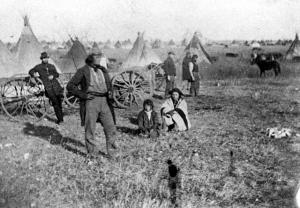 "I surrendered at Camp Release and gave my gun to Samuel J. Brown. He put me under guard, but said I would not be a prisoner very long. I was a prisoner for four years, being sent to Rock Island. Nothing was proved against me except that I was in some of the battles against the whites. I took no part in killing the settlers and was opposed to such work."
"I surrendered at Camp Release and gave my gun to Samuel J. Brown. He put me under guard, but said I would not be a prisoner very long. I was a prisoner for four years, being sent to Rock Island. Nothing was proved against me except that I was in some of the battles against the whites. I took no part in killing the settlers and was opposed to such work."
Wakandayamani (George Quinn), 1898
On September 23, Henry Sibley defeated a Dakota force led by Little Crow at Wood Lake. Three days later, the Dakota Peace Party turned over hostages at a spot that became known as Camp Release. The Dakota delivered more than 269 captives immediately; within a few days, a total of about 285 captives were handed over. Sibley later wrote,
"The Indians and half-breeds assembled . . . in considerable numbers, and I proceeded to give them very briefly my views of the late proceedings; my determination that the guilty parties should be pursued and overtaken, if possible, and I made a demand that all the captives should be delivered to me instantly, that I might take them to camp."
On September 28, 1862, two days after the surrender at Camp Release, a commission of military officers established by Henry Sibley began trying Dakota men accused of participating in the war. Several weeks later the trials were moved to the Lower Agency, where they were held in one of the only buildings left standing, trader François LaBathe’s summer kitchen.
Anderson, Gary Clayton, Woolworth, Alan R. Through Dakota Eyes: Narrative Accounts of the Minnesota Indian War of 1862. St. Paul: Minnesota Historical Society Press, 1988.
Monjeau-Marz, Corinne L. The Dakota Indian Internment at Fort Snelling, 1862-1864. St. Paul: Prairie Smoke Press, 2005.
Primary
Anderson, Gary Clayton and Alan R. Woolworth. Through Dakota Eyes: Narrative Accounts of the Minnesota Indian War of 1862. St. Paul: Minnesota Historical Society Press, 1988.
Websites
Sibley and the U.S.-Dakota War of 1862. Historic Fort Snelling.
Secondary
Monjeau-Marz, Corinne L. The Dakota Indian Internment at Fort Snelling, 1862-1864. St. Paul, MN: Prairie Smoke Press, 2005.




